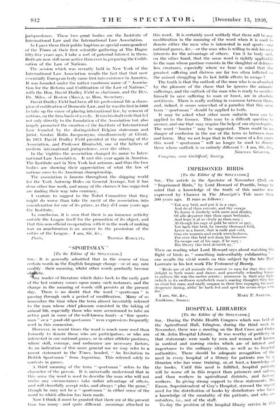"SPORTSMAN"
(7'o The Editor of the Sm.:crayon.'
Sum,—It is generally admitted that in the course of time certain words in the English language change—or at any rate modify—their meaning, whilst other words gradually become ot etc. . y reader of literature which dates back to the early part or the last century comes upon many such instances, and the change in the meaning of words still persists at the present day. There is no doubt that the word " sportsman " is passing through such a period of modification. Many of us remember the time when the term almost invariably referred to the man whose chief pleasure consisted in the taking of animal life, especially those who were accustomed to take an active part in sonic of the well-known hunts—a "fine sports- man " or a " good old sportsman " were expressions frequently used in this connexion.
However, in recent times the word is much more used than finuterly to denote those who are participators, or who are interested in our national games, or in other athletic pastimes, where skill, courage, and endurance are necessary factors. As an indication of this more general use we may refer to a recent statement in the Times, headed, '' An Invitation to British Sportsmen '' from Argentina. This referred solely to contests in games.
A third meaning of the term "sportsman " refers to the character of the person. It is universally understood that in this sense the word is used to describe the man who will not under any circumstances take unfair advantage of others, and will cheerfully accept risks, and always " play the game," though he may not be a " sportsman' in either sense of the word to which allusion has been made.
Now I think it must be granted that there are at the present time too many—and quite different meanings attached to' this word. It is certainly most unlikely that there will be any modification in the Meaning of the word when it is used to denote either the man who is interested in real sports—our national games, &e.—or the man who is willing to risk his own interests for the advantage of others. Can it he truly said, on the other hand, that the same word is rightly applicable to the man whose pastime consists in the slatighter of defence- less creatures, especially where we bear in mind that the greatest suffering and distress are far too often inflicted on the animal struggling in its last futile efforts to escape ?
The truth is that the outlook of the man who is so absorbed by the pleasure of the chase that he ignores the animals' sufferings, and the outlook of the man who is ready to sacrifice himself to save suffering to man or beast, are in absolute antithesis. There is really nothing in common between them, and, indeed, it seems somewhat of a paradox that this sonic term sportsman" should be applied to both.
It may be asked what other more suitable term can be applied to the former. This may be a difficult question to answer, and one that may require the help of our etymologist,. The word " hunter" may he suggested. There could be no danger of confusion in the use of the tents as between man and horse. May we not hope that in the course of a few years this wont " sportsman" will no longer he used to denote those whose outlook is so entirely different ?—I ant, Sir, &e, NORMAN C RA M. Compton, near Guildford, Surrey,














































 Previous page
Previous page